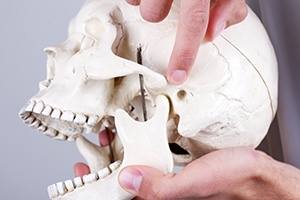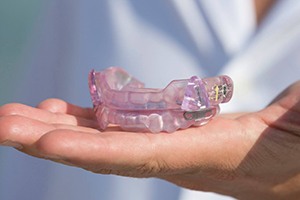TMJ Treatment Lakewood
Find Relief From Headaches and Jaw Pain
Whenever you speak, eat, or yawn, you rely on your temporomandibular joints (TMJs) to move your jaw. Unfortunately, these important joints are prone to becoming injured or overworked, leading to significant discomfort. Fortunately, the dentists at Lakewood Complete Dentistry can diagnose the problem and figure out the best way to help you find the relief you deserve. If you think you may need TMJ treatment in Lakewood, give us a call today to schedule an appointment.
Why Choose Lakewood Complete Dentistry for TMJ Treatment?
- Wide Variety of Treatment Options Available
- Knowledgeable, Caring Dental Experts
- State-of-the-Art Diagnostic Technology
What is TMJ Disorder?

A TMJ disorder is a condition that affects your jaw joints. It can have a number of possible causes, including a sudden blow to the face, a misaligned bite, or frequent grinding and clenching of the teeth (also known as bruxism). Untreated TMJ disorders are known to cause chronic face and jaw pain, and they can easily grow worse over time if they’re ignored for too long.
Symptoms of TMJ Disorder

You may have a TMJ disorder if any of the following symptoms sound familiar:
- You are experiencing chronic or recurring pain in your jaw.
- You often suffer from headaches and migraines.
- You hear a clicking or popping sound when you move your jaw.
- You have had a harder time chewing your food recently.
- Your jaw sometimes gets stuck in an open or closed position.
- You have noticed changes in your bite.
Types of TMJ Treatment

To treat a TMJ disorder, our team will first need to complete a thorough examination of your mouth and jaw. After learning more about your situation, we can devise a treatment plan that addresses the underlying cause of your pain. Here are some of the ways we can help our patients find relief from TMJ-related discomfort:
Occlusal Splint

An occlusal splint is a simple oral appliance that can be used to slightly adjust your lower jaw to help it find a better resting position. This takes some of the pressure off the TMJs so that they can rest and recover. On top of that, an occlusal splint can also prevent the upper and lower rows of teeth from making direct contact with each other. As a result, they can provide protection against the bruxism that may be contributing to your TMJ disorder.
Equilibration/Occlusal Adjustment

If your teeth aren’t aligned properly, they can throw off the way the forces of your bite are distributed, which can put unnecessary amounts of strain on the TMJs. To give the jaw joints a chance to relax, we can perform a procedure known as occlusal adjustment, which involves making slight changes to your teeth so that the upper and lower arches come in contact with each other in all the right spots.
BOTOX® for TMJ Treatment

BOTOX® can do more than just enhance your appearance; it can also be used to temporarily relieve TMJ-related pain, allowing patients to stay more comfortable while the underlying cause of the problem is dealt with. A small BOTOX® injection can relax the muscles around your jaw joints and stop them from making the unconscious movements that contribute to TMJ disorder, thus easing any jaw tension you’ve been experiencing.
TMJ Treatment FAQs
Is BOTOX for TMJ Safe?
BOTOX is short for “botulinum toxin,” which probably doesn’t sound very safe to have injected into your face! Rest assured, though, that your qualified TMJ dentist in Lakewood knows how to administer BOTOX safely, effectively, and in accordance with FDA guidelines. We follow strict sanitization procedures, and keep the dosage of botulinum toxin well below harmful levels.
Overall, research has shown BOTOX to be quite safe as a TMJ treatment, with very few patients experiencing serious side effects. If you’re concerned about using BOTOX for TMJ relief, please don’t hesitate to let us know!
How Long Does TMJ Treatment Take?
It depends on which treatment you’re receiving. Here’s a quick breakdown of average treatment timelines for each TMJ solution we offer here in Lakewood:
- Occlusal splints have to be worn every night during treatment. It can take anywhere between a few weeks to a couple of months for symptoms to alleviate, but in many cases it’s a permanent solution.
- Equilibration/occlusal adjustments have the most difficult timeline to pin down. You can reasonably expect TMJ symptoms to subside soon after your bite is properly aligned, which might be a matter of days if your misalignment is mild or a matter of months if it’s more severe.
- BOTOX easily provides the fastest relief. Within a week of receiving your injections, your muscles should start to relax, easing the pressure being exerted on your TMJ. BOTOX is often a temporary solution, though, so keep in mind your results may only last for three to six months.
Can TMJ Be Treated Without Surgery?
Yes, and in fact, experts recommend treating TMJ disorders as conservatively as possible. Since surgery means making irreversible changes to the jaw and nearby structures, it’s best to see if less invasive treatments are able to provide relief.
Note that while an equilibration/occlusal adjustment does also involve permanent changes, reshaping your teeth is still considered to be a minor procedure. Our occlusal splints and BOTOX injections, of course, don’t require any surgery, and the vast majority of patients can receive these treatments without complications, regardless of age.
Does Equilibration/Occlusal Adjustment for TMJ Hurt?
Rest assured, we’ll do everything possible to make sure your TMJ treatment in Lakewood is comfortable! If we simply need to add mass to your teeth with a composite resin, you will likely not even need a local anesthetic. If the plan is to adjust your bite by shaving down your enamel, though, trust that we’ll be providing that anesthetic. This will effectively numb your mouth, and you should only feel some slight pressure as we work.
Once the anesthetic wears off, you’ll probably be sore. We recommend making sure you’re well-stocked with ibuprofen or Tylenol, and that you have an ice pack you can use as a cold compress. All things considered, post-treatment soreness is usually manageable with OTC and DIY solutions.

